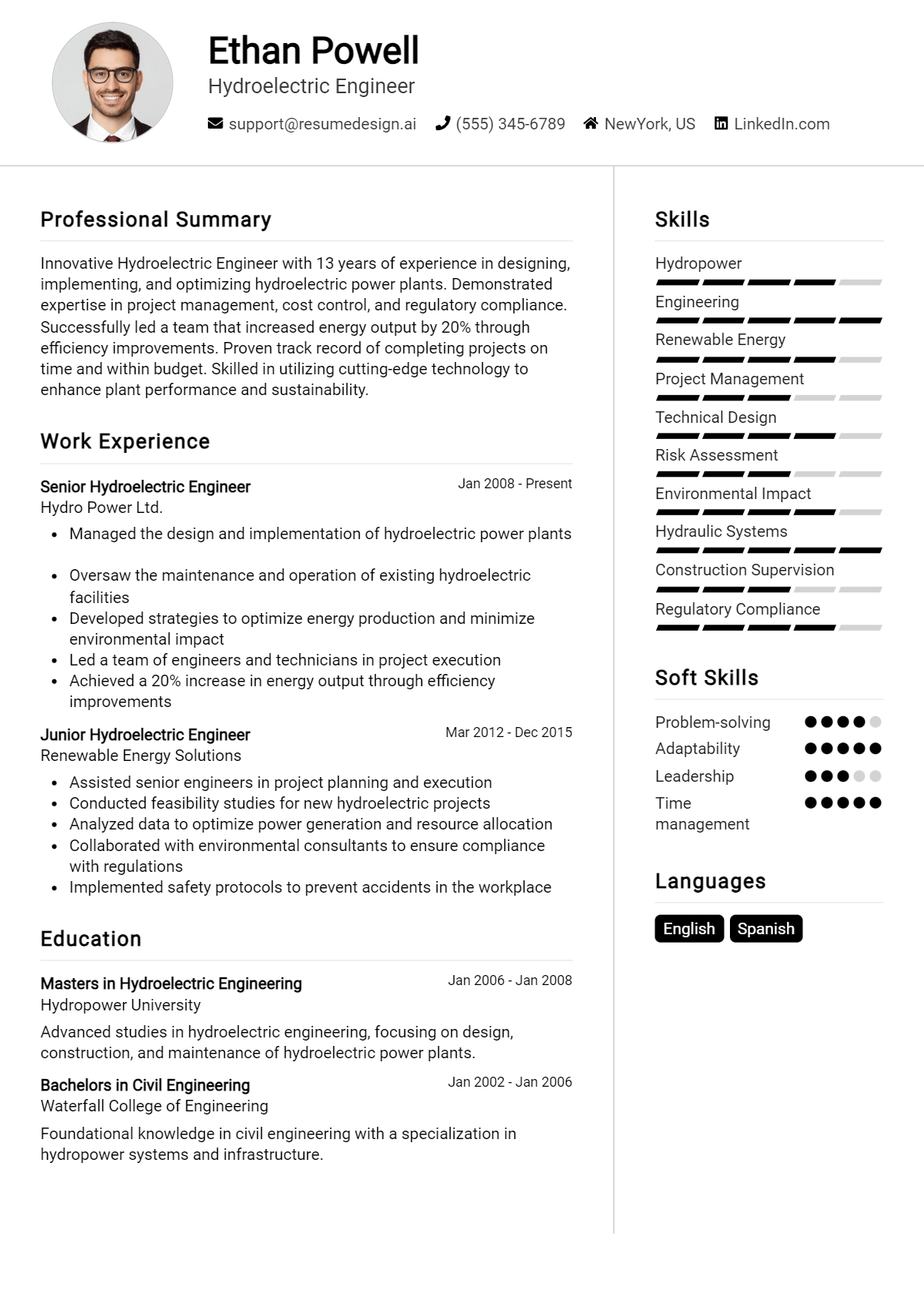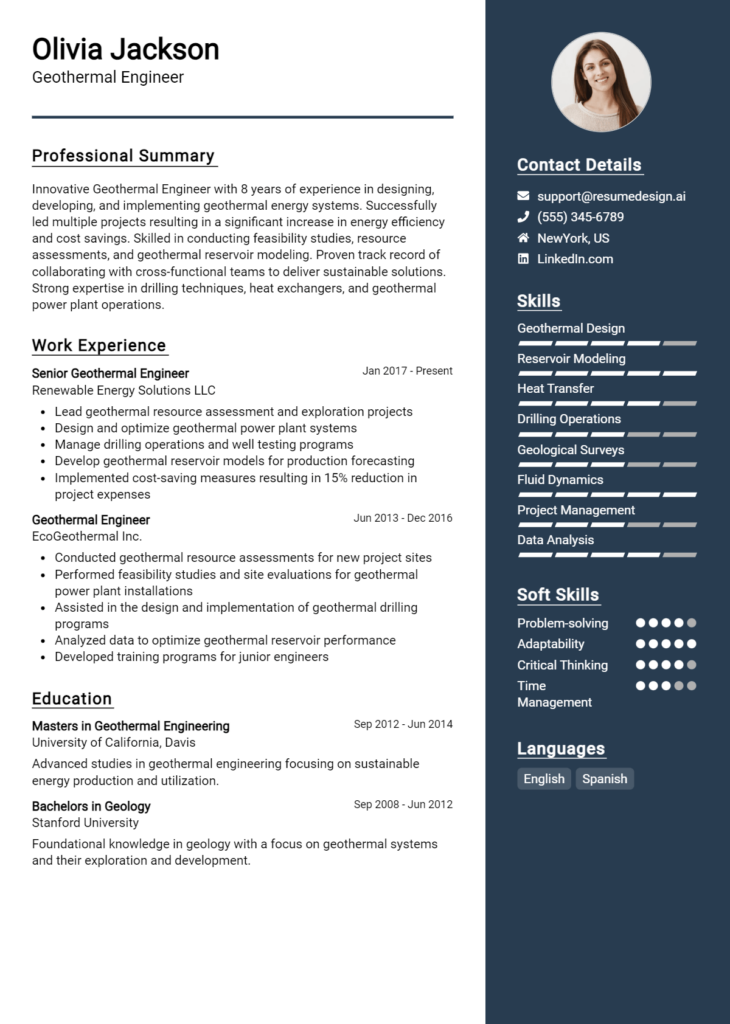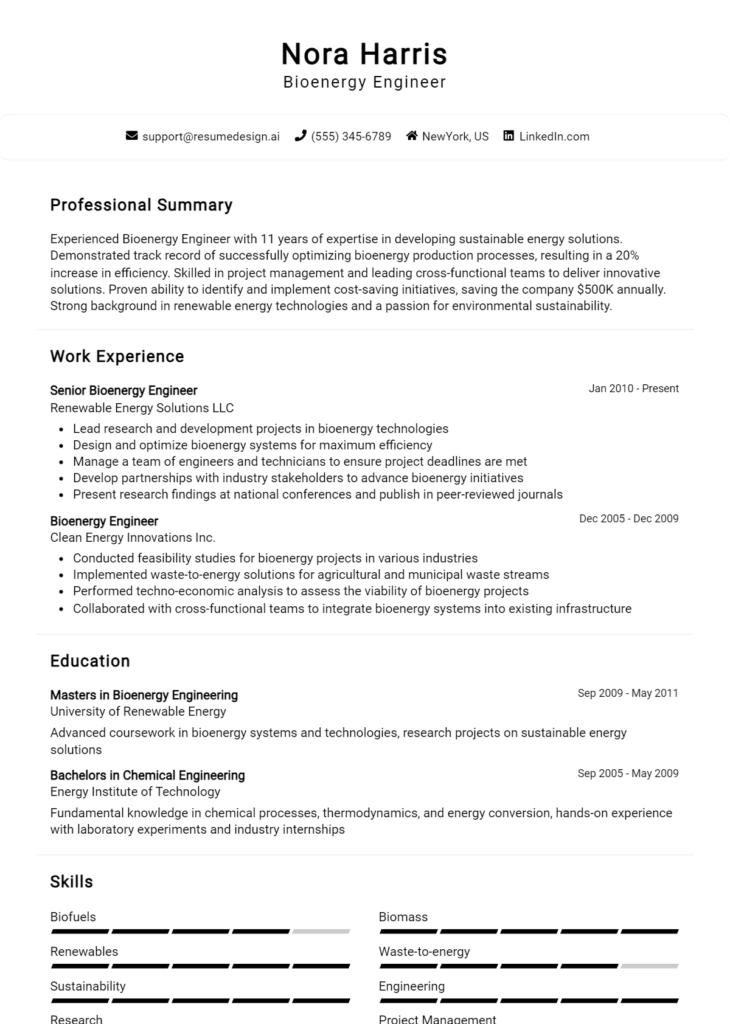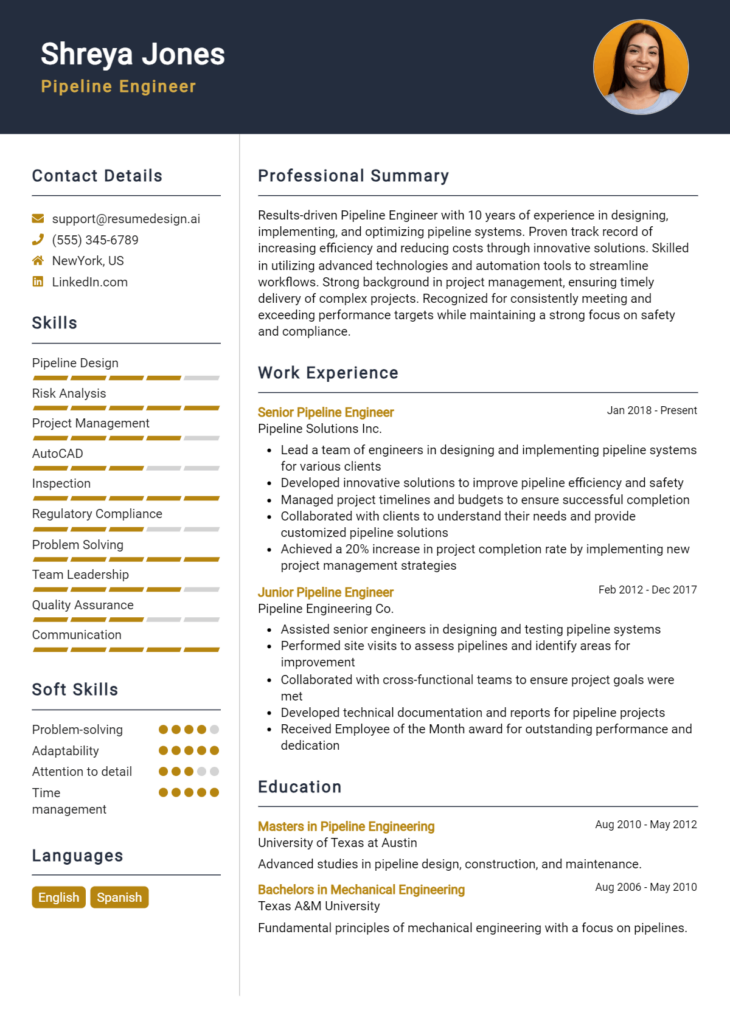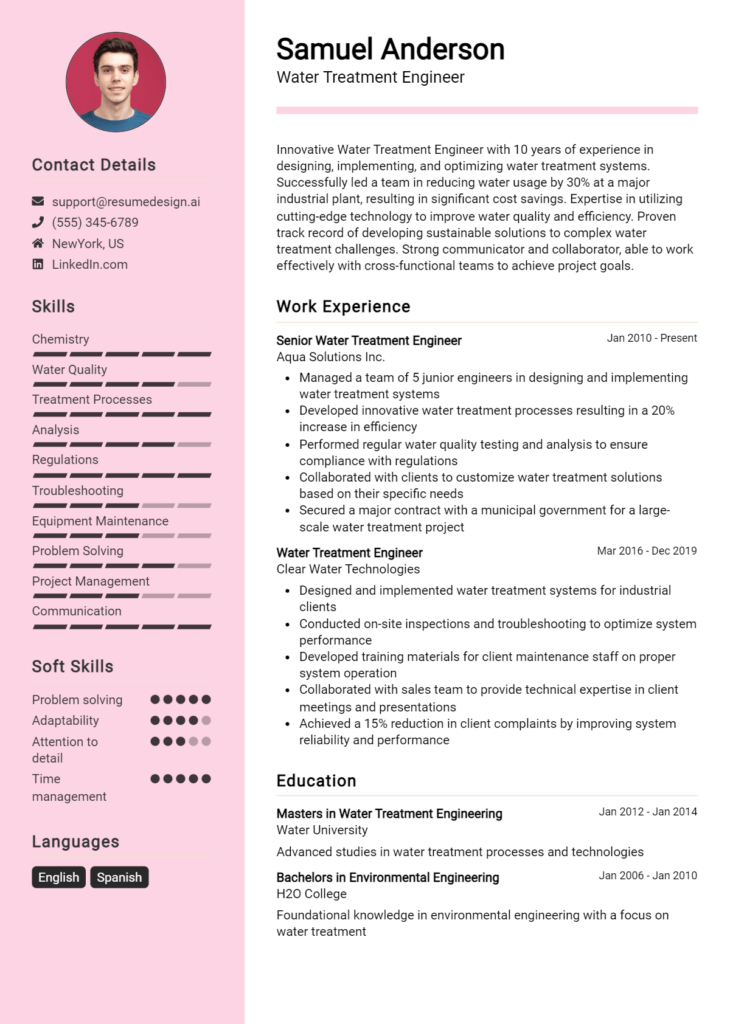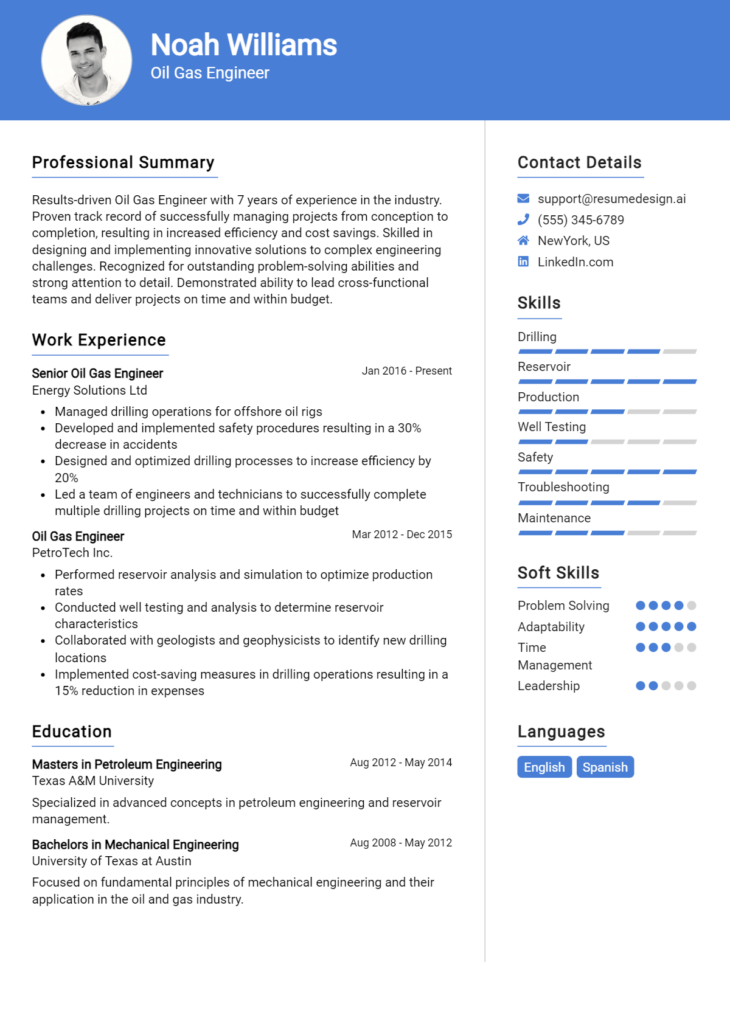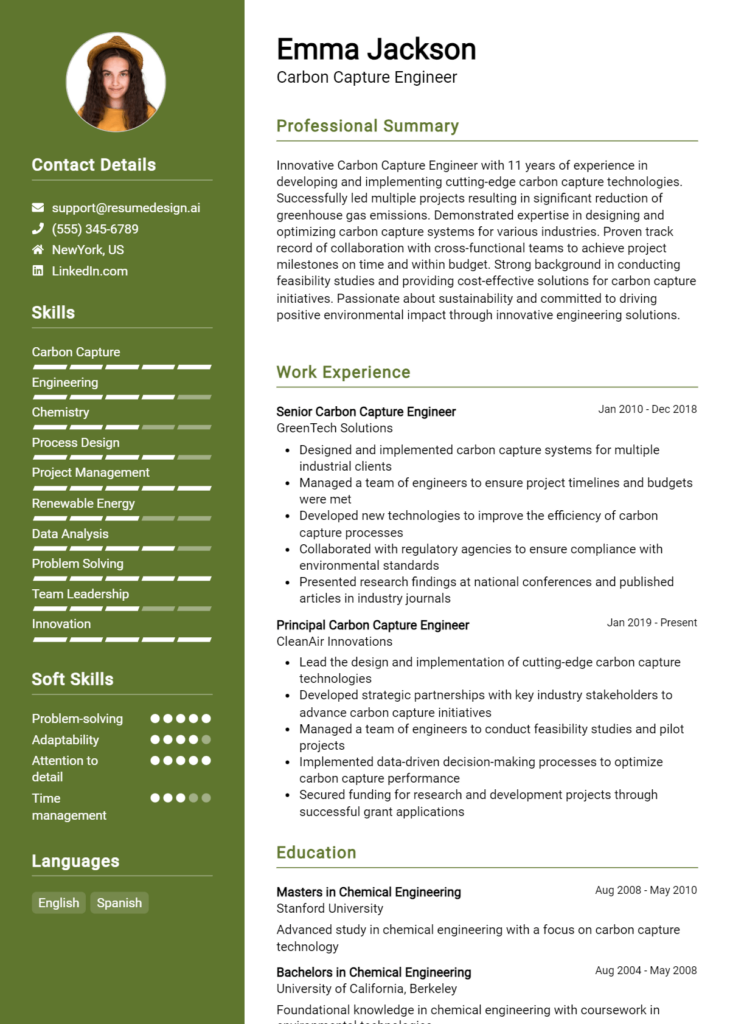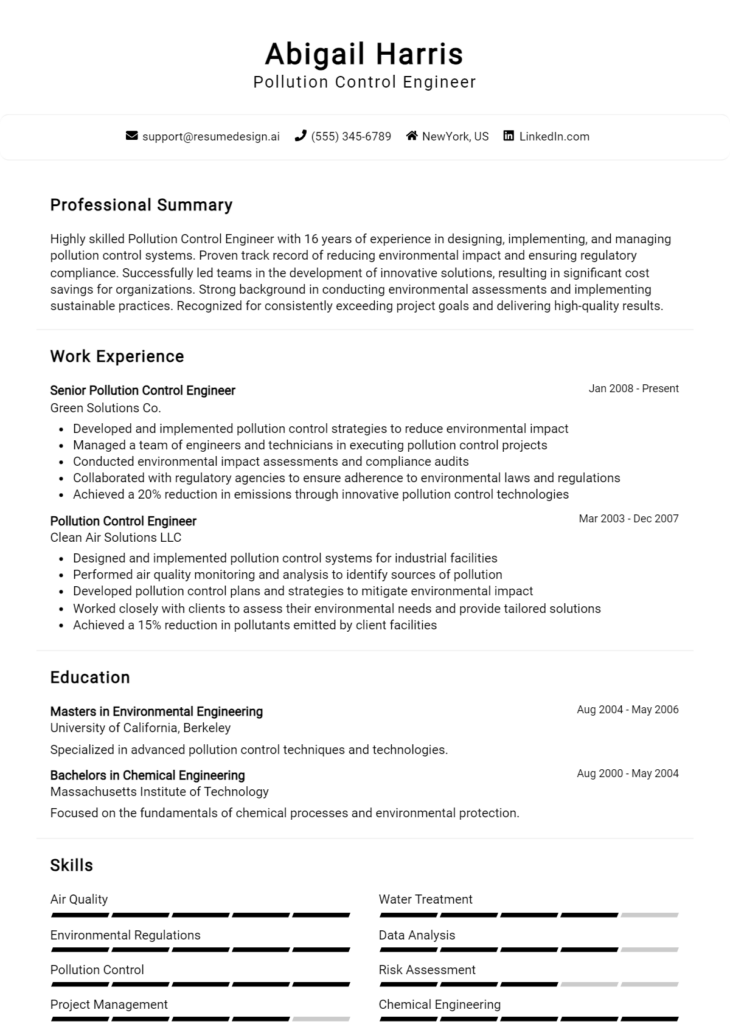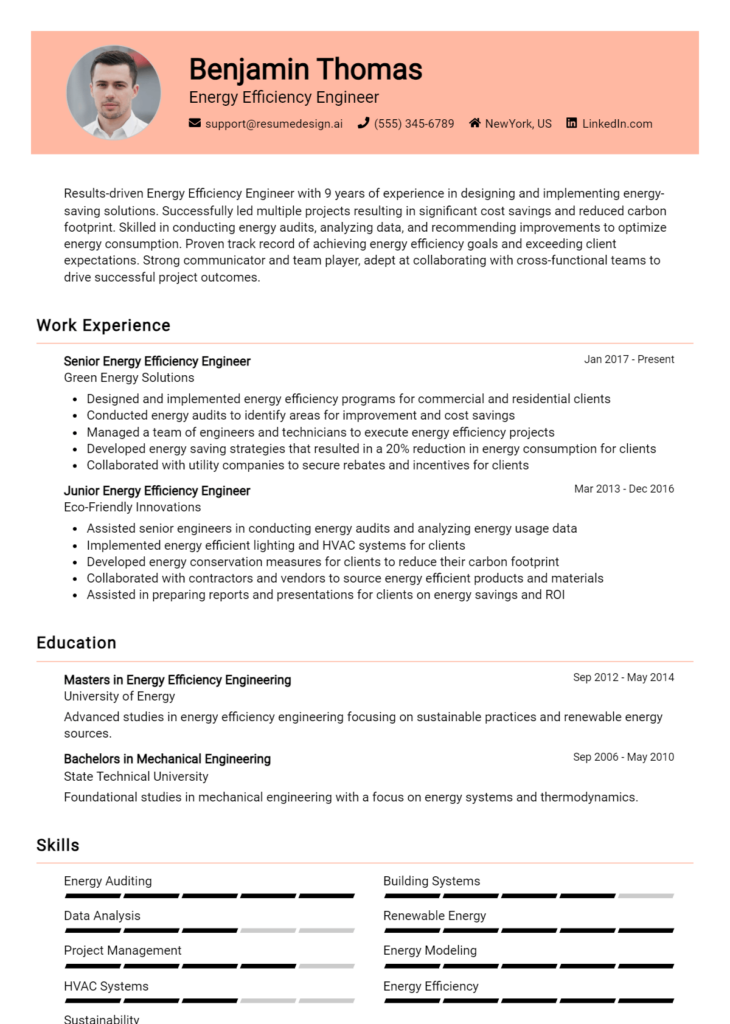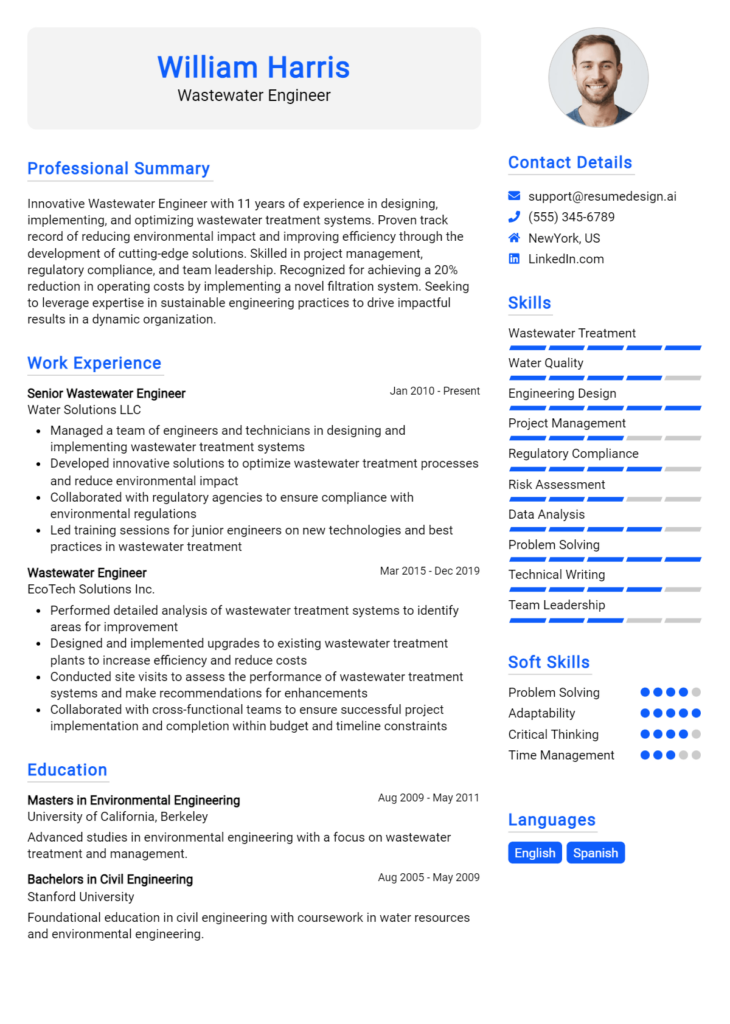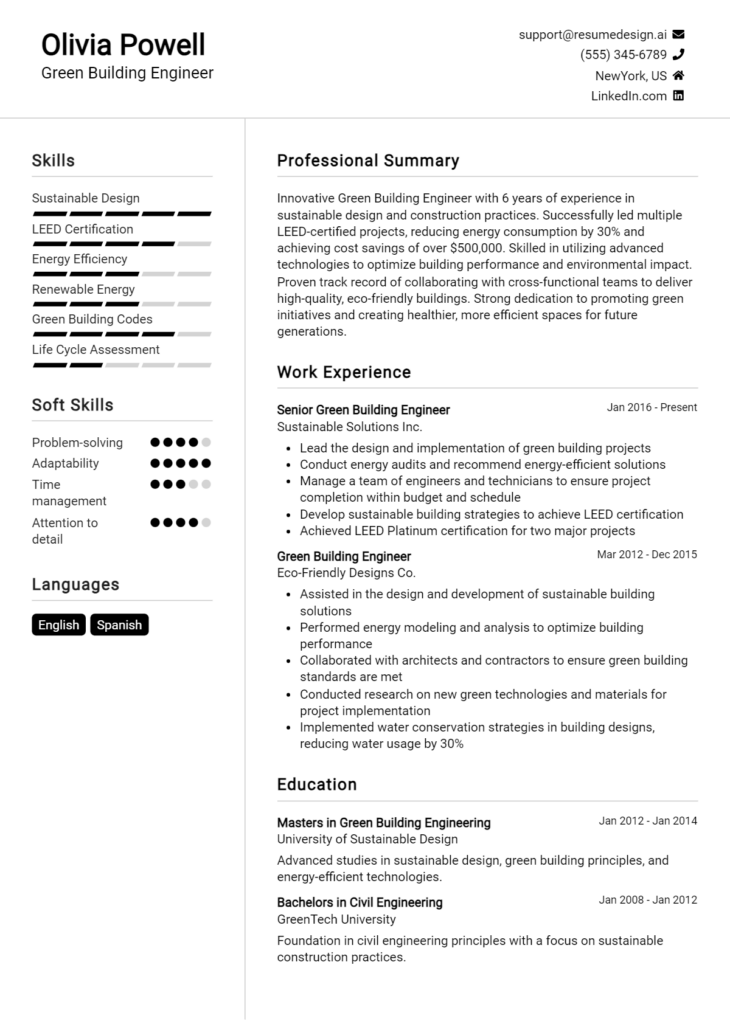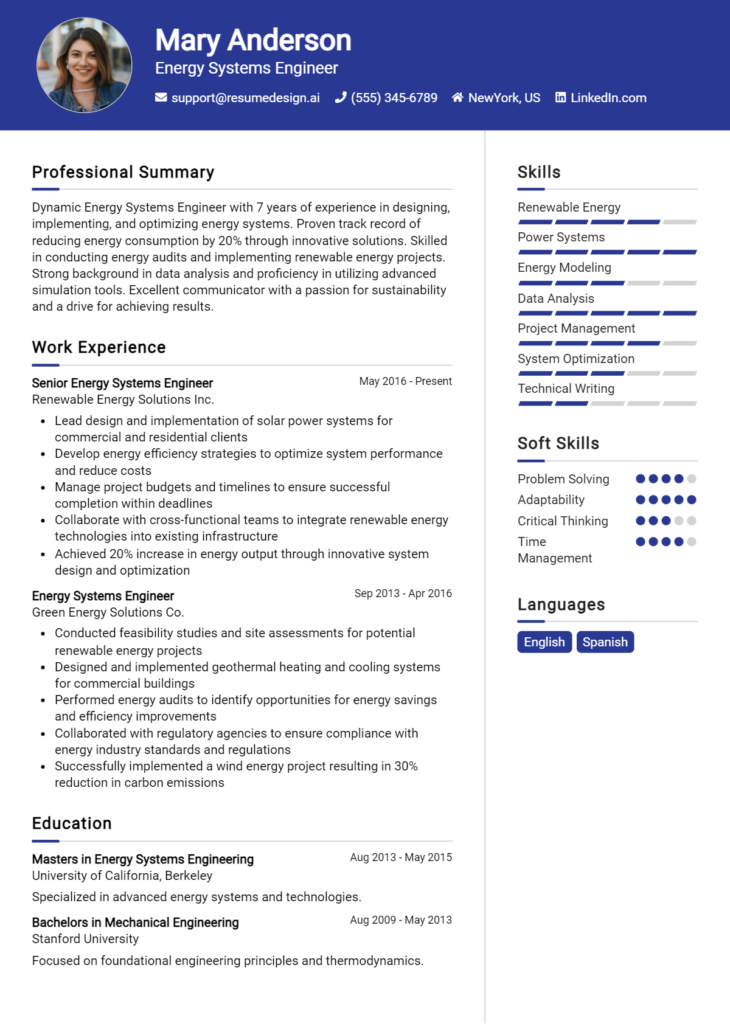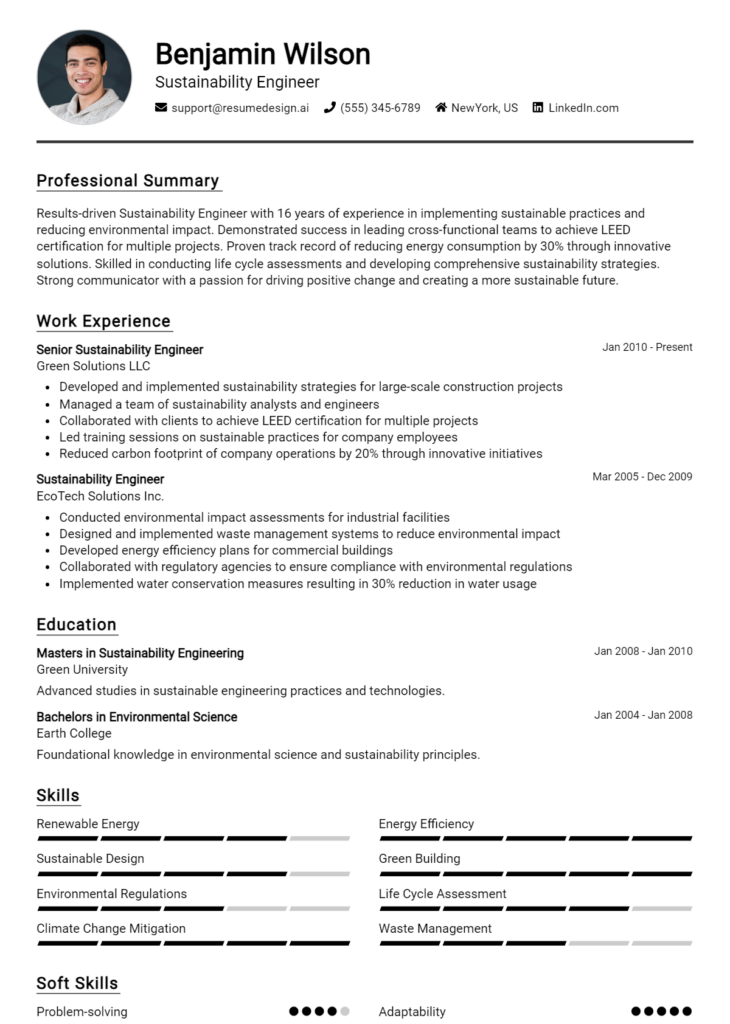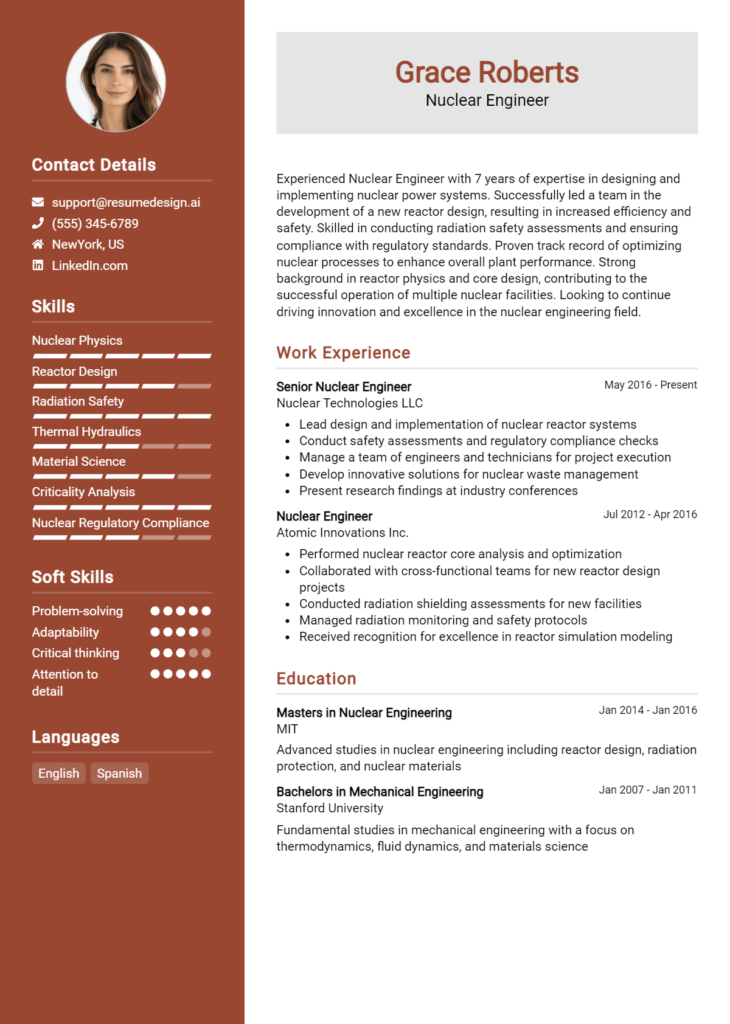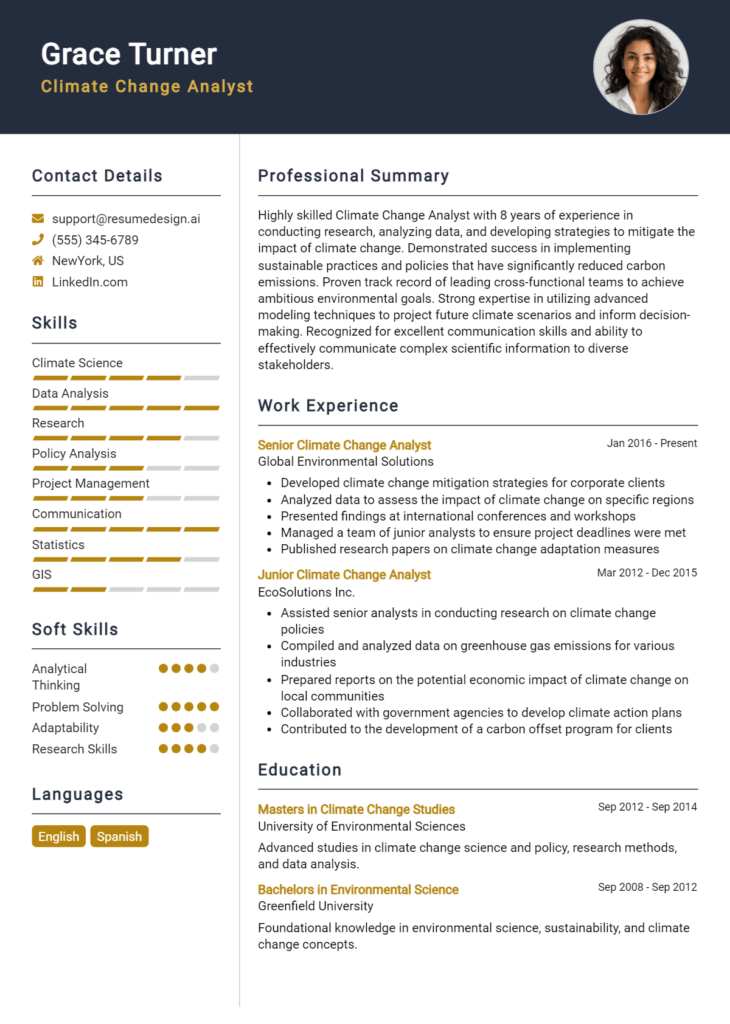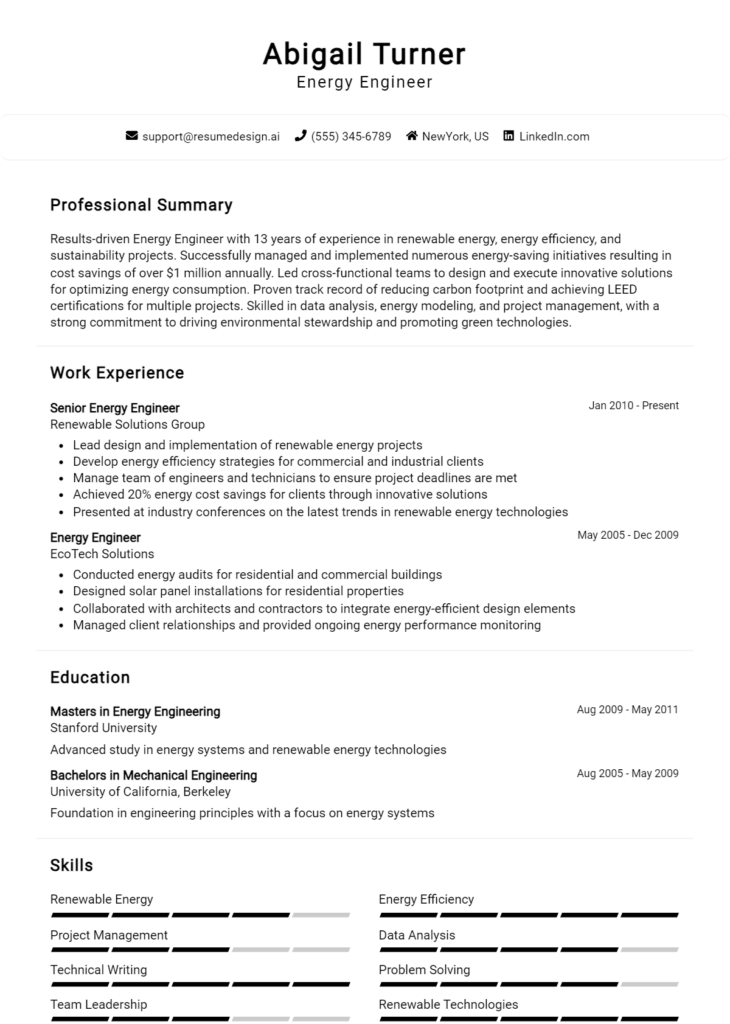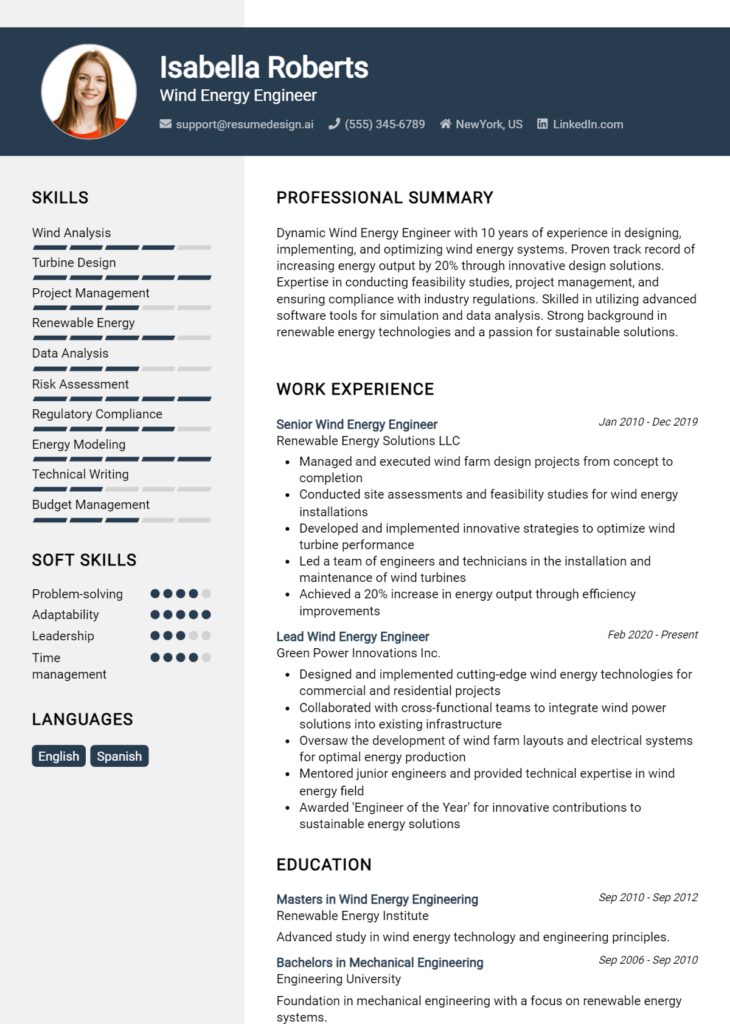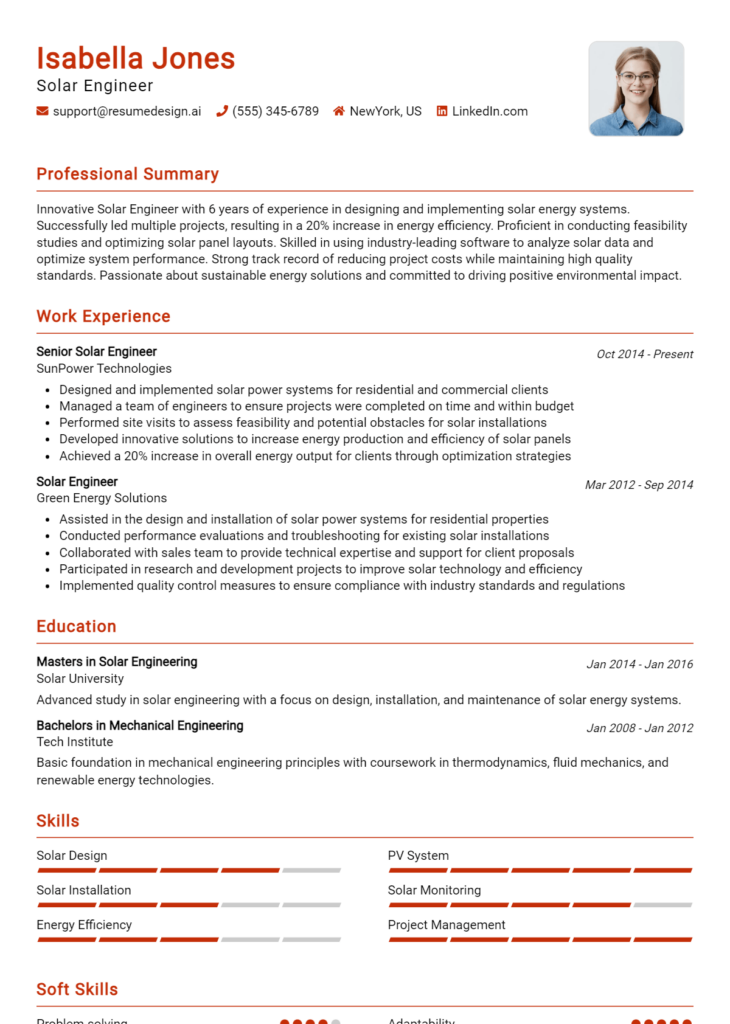Hydroelectric Engineer Core Responsibilities
A Hydroelectric Engineer is responsible for designing, developing, and maintaining hydroelectric power systems. This role requires a blend of technical expertise in engineering principles, operational knowledge of power generation processes, and strong problem-solving abilities to address challenges in project implementation. Hydroelectric Engineers collaborate across departments—such as project management, environmental science, and operations—to ensure projects align with organizational goals. A well-structured resume showcasing these skills and experiences is essential for demonstrating value to potential employers.
Common Responsibilities Listed on Hydroelectric Engineer Resume
- Design and analyze hydroelectric power generation systems.
- Conduct feasibility studies and site assessments for new projects.
- Collaborate with cross-functional teams to ensure project success.
- Monitor and optimize system performance and efficiency.
- Ensure compliance with environmental regulations and safety standards.
- Prepare technical reports and project documentation.
- Conduct risk assessments and develop mitigation strategies.
- Oversee construction and installation of hydroelectric facilities.
- Implement maintenance schedules and emergency response plans.
- Research advancements in hydroelectric technology and practices.
- Provide technical support during project lifecycle.
- Manage project budgets and timelines effectively.
High-Level Resume Tips for Hydroelectric Engineer Professionals
In today's competitive job market, a well-crafted resume is essential for Hydroelectric Engineer professionals aiming to make a lasting impression on potential employers. As the first point of contact between a candidate and an employer, your resume should effectively showcase your skills, accomplishments, and relevant experience in hydroelectric engineering. It serves not only as a summary of your qualifications but also as a reflection of your professionalism and attention to detail. In this guide, we will provide practical and actionable resume tips specifically tailored for Hydroelectric Engineer professionals, ensuring that your application stands out in a pool of candidates.
Top Resume Tips for Hydroelectric Engineer Professionals
- Tailor your resume to align with the job description by incorporating keywords and phrases that reflect the specific requirements of the position.
- Highlight relevant experience in hydroelectric projects, including design, construction, and maintenance, to demonstrate your expertise in the field.
- Quantify your achievements by including metrics such as the capacity of hydroelectric plants you have worked on or efficiency improvements you have implemented.
- Showcase industry-specific skills such as knowledge of hydrology, turbine operation, and regulatory compliance to highlight your technical proficiency.
- Include certifications and licenses relevant to hydroelectric engineering, such as Professional Engineer (PE) status, to enhance your credibility.
- Use clear and concise language to ensure that your resume is easy to read and understand, avoiding jargon unless it is commonly recognized in the industry.
- Incorporate a summary statement at the top of your resume that encapsulates your career goals and key qualifications as a Hydroelectric Engineer.
- List your education prominently, especially if you have a degree in civil, mechanical, or environmental engineering, as they are highly relevant to the field.
- Consider including volunteer work or internships that are related to hydroelectric projects, as they can complement your professional experience.
- Keep your resume to one or two pages, ensuring that every word adds value and contributes to your overall narrative as a qualified candidate.
By implementing these tips, you can significantly enhance your resume and increase your chances of landing a job in the Hydroelectric Engineer field. A polished and tailored resume not only showcases your technical skills and accomplishments but also demonstrates your commitment to the profession, making a compelling case for why you are the ideal candidate for the role.
Why Resume Headlines & Titles are Important for Hydroelectric Engineer
In the competitive landscape of hydroelectric engineering, a well-crafted resume headline or title serves as a crucial element in capturing the attention of hiring managers. This succinct phrase acts as a first impression, summarizing a candidate's key qualifications and setting the tone for the rest of the resume. A strong headline can immediately highlight relevant skills and experiences, making it easier for hiring managers to identify the candidate's fit for the position. It should be concise, relevant, and directly related to the job being applied for, ensuring that it resonates with the employer’s needs and stands out in a stack of applications.
Best Practices for Crafting Resume Headlines for Hydroelectric Engineer
- Keep it concise: Aim for a headline that is short and to the point, ideally under 10 words.
- Be role-specific: Tailor the headline to reflect the specific hydroelectric engineering position you're applying for.
- Highlight key qualifications: Include prominent skills or experiences that are relevant to hydroelectric engineering.
- Use industry keywords: Incorporate terms that are commonly used in the hydroelectric engineering field to enhance visibility.
- Avoid clichés: Steer clear of overused phrases that fail to convey your unique strengths.
- Showcase achievements: If possible, include quantifiable achievements that demonstrate your impact in previous roles.
- Focus on value: Convey how your skills and experiences can add value to the potential employer.
- Revise and refine: Take the time to iterate on your headline until it effectively represents your professional identity.
Example Resume Headlines for Hydroelectric Engineer
Strong Resume Headlines
Innovative Hydroelectric Engineer with 10+ Years of Experience in Sustainable Energy Solutions
Expert in Hydropower Systems Design and Optimization for Enhanced Efficiency
Results-Driven Hydroelectric Engineer Specializing in Project Management and Renewable Energy Initiatives
Weak Resume Headlines
Engineer Looking for a Job
Experienced Professional in Various Engineering Fields
The strong headlines are effective because they clearly convey the candidate’s expertise, experience, and focus within the hydroelectric engineering domain, making an immediate impact on hiring managers. They incorporate specific skills and achievements that align with the job role, creating a compelling argument for the candidate's suitability. In contrast, the weak headlines lack specificity and fail to showcase any unique qualifications or relevance to the job, making them forgettable and less likely to attract attention in a competitive job market.
Writing an Exceptional Hydroelectric Engineer Resume Summary
A well-crafted resume summary is critical for a Hydroelectric Engineer as it serves as the first impression a hiring manager has of a candidate. This brief yet impactful section can quickly grab attention by showcasing key skills, relevant experience, and notable accomplishments that align with the specific job requirements. An effective summary should be concise, ideally no more than a few sentences, yet powerful enough to communicate the candidate's value proposition. Tailoring this summary to the job description not only demonstrates interest but also helps to position the candidate as a strong fit for the role.
Best Practices for Writing a Hydroelectric Engineer Resume Summary
- Quantify achievements where possible to provide measurable impact.
- Focus on key skills that are directly relevant to hydroelectric engineering.
- Tailor the summary to align with the job description and company goals.
- Use industry-specific terminology to demonstrate expertise.
- Highlight certifications and technical proficiencies pertinent to the role.
- Keep it concise—ideally 2-4 sentences that summarize your career highlights.
- Showcase your problem-solving abilities and innovative approaches to engineering challenges.
- Include any leadership or project management experience that adds value to your candidacy.
Example Hydroelectric Engineer Resume Summaries
Strong Resume Summaries
Dynamic Hydroelectric Engineer with over 8 years of experience in designing and optimizing hydroelectric systems, resulting in a 25% increase in energy efficiency for multiple projects. Proven track record of managing cross-functional teams to deliver projects on time and under budget.
Results-driven engineer specializing in renewable energy solutions, with a Master's degree in Civil Engineering and extensive experience in hydroelectric plant operations. Successfully led a team that reduced operational costs by 30% while enhancing system reliability through innovative maintenance practices.
Detail-oriented Hydroelectric Engineer with 5+ years of experience in hydrology modeling and environmental impact assessments. Recognized for developing a water management strategy that decreased environmental footprint by 15% while maintaining energy output levels.
Weak Resume Summaries
Experienced engineer looking for a position in hydroelectric energy. I have some skills and knowledge in this field.
Hydroelectric Engineer with a background in various projects. I am a good team player and can contribute to your company.
The strong resume summaries are considered effective due to their specific quantifiable achievements, relevant skills, and direct alignment with the hydroelectric engineering field. They present a clear picture of the candidate's capabilities and successes, making them memorable to hiring managers. In contrast, the weak summaries lack detail and impact, failing to convey the candidate's specific qualifications or contributions, which makes them less appealing in a competitive job market.
Work Experience Section for Hydroelectric Engineer Resume
The work experience section of a Hydroelectric Engineer resume is a critical component that highlights a candidate's technical skills, project management capabilities, and ability to deliver high-quality results in the field of hydroelectric energy. This section serves to demonstrate the practical application of engineering principles and the successful execution of projects, which are essential for potential employers looking for qualified candidates. By quantifying achievements and aligning experience with industry standards, candidates can effectively showcase their contributions to previous projects, making their resume stand out in a competitive job market.
Best Practices for Hydroelectric Engineer Work Experience
- Use action verbs to describe your responsibilities and achievements clearly.
- Quantify results wherever possible, using metrics like energy output, cost savings, or project completion time.
- Highlight specific technical skills relevant to hydroelectric engineering, such as software proficiency or design methodologies.
- Emphasize team collaboration and leadership roles in projects to demonstrate your ability to drive results.
- Align your experiences with industry standards and best practices to show familiarity with current technologies and regulations.
- Include relevant certifications and training that enhance your qualifications in hydroelectric engineering.
- Tailor your experience to reflect the specific requirements of the job you are applying for.
- Keep descriptions concise and focused on the most impactful contributions you've made in previous roles.
Example Work Experiences for Hydroelectric Engineer
Strong Experiences
- Led a team of engineers in the design and implementation of a 150 MW hydroelectric power plant, resulting in a 20% increase in energy efficiency and reducing operational costs by 15%.
- Managed the successful upgrade of an existing hydroelectric facility, which improved energy output by 30% and received an award for sustainability from the local government.
- Developed a predictive maintenance schedule that decreased downtime by 25% and increased overall plant availability, contributing to a revenue increase of $1.2 million annually.
Weak Experiences
- Worked on hydroelectric projects and assisted in various tasks.
- Participated in team meetings to discuss project updates.
- Helped with the maintenance of equipment at a hydroelectric plant.
The examples above illustrate the distinction between strong and weak experiences in a Hydroelectric Engineer's resume. Strong experiences are specific, quantifiable, and demonstrate leadership and technical expertise, showcasing the candidate's direct impact on project outcomes. In contrast, weak experiences lack detail and fail to convey significant contributions or results, making it difficult for potential employers to assess the candidate's qualifications and capabilities effectively.
Education and Certifications Section for Hydroelectric Engineer Resume
The education and certifications section in a Hydroelectric Engineer resume is crucial as it showcases the candidate's academic qualifications and their commitment to the field through continuous learning. This section not only highlights the foundational knowledge gained through relevant degrees but also emphasizes industry-recognized certifications that validate the engineer's expertise. By providing details on relevant coursework and specialized training, candidates can significantly enhance their credibility and demonstrate alignment with the specific requirements of the job role. Employers often look for candidates who not only possess the necessary educational background but also show a dedication to staying current in the rapidly evolving field of hydroelectric engineering.
Best Practices for Hydroelectric Engineer Education and Certifications
- Focus on relevant degrees such as Civil Engineering, Environmental Engineering, or Renewable Energy.
- Include industry-recognized certifications like Professional Engineer (PE) or Certified Energy Manager (CEM).
- Detail any specialized training related to hydroelectric systems or renewable energy technologies.
- List relevant coursework that demonstrates expertise in hydrology, fluid mechanics, and electrical systems.
- Highlight advanced degrees, such as a Master's or PhD, that indicate a deeper knowledge of the field.
- Keep the section concise but detailed enough to convey your qualifications effectively.
- Update this section regularly to reflect any new certifications or educational achievements.
- Consider including professional development courses or workshops that relate to hydroelectric engineering.
Example Education and Certifications for Hydroelectric Engineer
Strong Examples
- Bachelor of Science in Civil Engineering, University of California, Berkeley, 2018
- Professional Engineer (PE) License, State of California, 2020
- Certified Hydrologic Technician (CHT), Association of State Floodplain Managers, 2021
- Relevant Coursework: Hydrology, Renewable Energy Systems, Fluid Mechanics, and Environmental Impact Assessment
Weak Examples
- Bachelor of Arts in English Literature, University of Texas, 2015
- Certification in Basic Computer Skills, 2019
- Associate Degree in General Studies, Community College, 2016
- Outdated Certification in Basic Electrical Engineering, 2010
The strong examples are considered effective because they directly align with the qualifications required for a Hydroelectric Engineer, showcasing relevant degrees, certifications, and courses that demonstrate expertise in the field. In contrast, the weak examples lack relevance to hydroelectric engineering, either focusing on unrelated fields or presenting outdated or non-industry-recognized credentials, which do not contribute to the candidate's qualifications for the role.
Top Skills & Keywords for Hydroelectric Engineer Resume
As a Hydroelectric Engineer, having the right skills is essential not only for creating efficient and sustainable energy solutions but also for standing out in a competitive job market. A well-crafted resume that highlights both hard and soft skills can significantly enhance your chances of landing your dream job. Employers look for a balanced blend of technical expertise and interpersonal abilities to ensure that candidates can effectively contribute to project teams and communicate complex concepts to stakeholders. By focusing on the key skills relevant to the field, candidates can demonstrate their qualifications and readiness to tackle the unique challenges of hydroelectric engineering.
Top Hard & Soft Skills for Hydroelectric Engineer
Soft Skills
- Problem-solving
- Team collaboration
- Communication skills
- Adaptability
- Critical thinking
- Project management
- Attention to detail
- Leadership
- Time management
- Creativity
Hard Skills
- Hydrology and fluid dynamics
- Structural analysis
- Electrical systems design
- Environmental impact assessments
- CAD software proficiency
- Power generation systems
- Geotechnical engineering
- Regulatory compliance knowledge
- Data analysis and modeling
- Renewable energy technologies
By incorporating these skills into your resume, along with relevant work experience, you can effectively showcase your qualifications as a Hydroelectric Engineer.
Stand Out with a Winning Hydroelectric Engineer Cover Letter
I am writing to express my interest in the Hydroelectric Engineer position at [Company Name], as advertised on [where you found the job listing]. With a strong background in civil engineering and a specialization in hydropower systems, I am excited about the opportunity to contribute to your team and help advance sustainable energy solutions. My academic training, combined with hands-on experience in designing and optimizing hydroelectric facilities, has equipped me with the skills necessary to excel in this role.
During my previous role at [Previous Company Name], I successfully managed multiple projects that involved the design, construction, and maintenance of hydroelectric plants. I led a team that implemented innovative solutions to enhance the efficiency of existing systems, resulting in a 15% increase in energy output while reducing operational costs. My proficiency in using advanced simulation software and my strong analytical skills allowed me to assess and mitigate potential risks associated with hydropower operations, ensuring compliance with environmental regulations and safety standards.
I am particularly drawn to [Company Name] because of its commitment to sustainable energy practices and its reputation for pioneering projects that harness the power of water effectively. I am eager to bring my expertise in project management, environmental impact assessment, and renewable energy technologies to your esteemed organization. I am confident that my proactive approach and dedication to continuous improvement will contribute positively to your team and align with your mission of promoting clean energy solutions.
Thank you for considering my application. I look forward to the opportunity to discuss how my background, skills, and enthusiasms align with the goals of [Company Name]. I am excited about the possibility of contributing to innovative hydropower projects and am eager to explore how I can be a valuable asset to your team.
Common Mistakes to Avoid in a Hydroelectric Engineer Resume
Crafting a compelling resume as a hydroelectric engineer is essential to stand out in a competitive job market. However, many candidates make critical mistakes that can undermine their qualifications and experience. By avoiding these common pitfalls, you can create a resume that effectively showcases your skills and expertise in the field of hydroelectric engineering.
Neglecting Tailoring: Failing to customize your resume for specific job applications can lead to missed opportunities. Each position may require unique skills, and tailoring your resume to highlight relevant experience is crucial.
Overloading with Technical Jargon: While technical expertise is essential, overusing jargon can alienate hiring managers who may not be familiar with the specific terminology. Strive for clarity while still demonstrating your technical prowess.
Ignoring Soft Skills: Hydroelectric engineering often requires teamwork, communication, and problem-solving skills. Omitting these soft skills can create an incomplete picture of your capabilities.
Inadequate Project Descriptions: Simply listing projects without describing your role and contributions diminishes the impact of your experience. Provide details on your responsibilities, achievements, and the technologies you utilized.
Lack of Quantifiable Achievements: Failing to include measurable outcomes from your work can weaken your resume. Use metrics wherever possible to demonstrate the impact of your contributions, such as energy produced or cost savings achieved.
Using an Unprofessional Format: A cluttered or poorly organized resume can detract from your qualifications. Ensure your resume has a clean, professional layout that is easy to read and visually appealing.
Omitting Continuing Education: In a rapidly evolving field like hydroelectric engineering, it’s essential to show that you are committed to ongoing learning. List relevant certifications, courses, or workshops to highlight your dedication to professional development.
Leaving Out Relevant Software Proficiencies: Hydroelectric engineers often use specialized software for design and simulation. Failing to mention your proficiency in industry-specific tools can make your resume less competitive.
Conclusion
As we’ve explored the multifaceted role of a Hydroelectric Engineer, it’s clear that this position requires a unique blend of technical expertise, environmental awareness, and innovative problem-solving skills. Hydroelectric Engineers are pivotal in designing and optimizing systems that harness the power of water, ensuring efficiency while minimizing ecological impact. Key responsibilities include conducting feasibility studies, designing hydraulic systems, and overseeing the construction and operation of hydroelectric plants.
In addition to technical skills, effective communication and project management abilities are essential for collaboration with various stakeholders, including government agencies, environmental organizations, and the public. Staying updated with the latest industry trends, regulations, and technological advancements is also critical for success in this field.
As you reflect on the insights shared in this article, consider reviewing your Hydroelectric Engineer resume to highlight your relevant skills and experiences. A well-crafted resume can significantly enhance your job prospects in this competitive field. To assist you, we offer a range of useful tools:
- Explore our resume templates to find a design that fits your style.
- Utilize our resume builder for a straightforward way to create a polished resume.
- Check out our resume examples for inspiration on how to effectively showcase your qualifications.
- Don’t forget to pair your resume with a compelling introduction using our cover letter templates.
Take action today to ensure your resume reflects your expertise and sets you apart in the job market.

